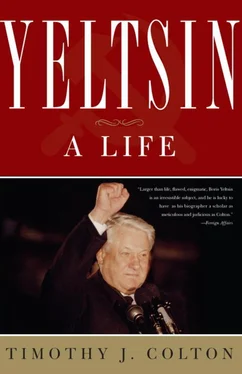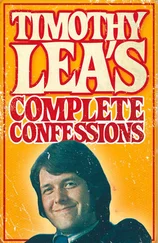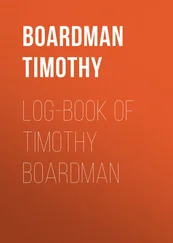As a sign of the times, the city had its own penal colony, an arm of the camp complex at the conflux of the Kama and the Vishera, the first Gulag outpost in the Urals. The encampment on Adamova Hill, assigned in May 1929 to build the Berezniki Potash Combine on log piles driven into a bog, had as many as ten thousand workers in the early 1930s. Convicts were needed because free laborers did not want to go to Berezniki, which was short of housing and food and had had an outbreak of typhus in 1930. As the OGPU (renamed the NKVD in 1934) reassigned the prisoners to new building sites, other workers, many of them former inmates or indigent deportees under police restrictions, took their place. “The mass of the builders of the city were exiles and resettled people—dekulakized peasants from central Russia, Tatariya, and Ukraine, politically unreliable elements, counterrevolutionaries, intellectuals, and so forth. Later [during World War II] they would be joined by [deported] Volga Germans, Crimean Tatars, et cetera.” 68Berezniki was a venue for the dregs of society, as those who ruled Soviet society defined it.
Nikolai Yeltsin’s older brother, Ivan, was already in Berezniki, having been sent to involuntary labor there in 1935 for “subverting” grain procurement in Butka (he could not meet his quota despite selling all he had to make up the difference); he checked in with the NKVD but was not in lockup. Before 1936 was out, Nikolai and Ivan’s bereaved mother, Anna, had come to be with Ivan after burying her husband at Nadezhdinsk. Dmitrii and Andrian Yeltsin were soon to join them from Butka and Dmitrov. Nikolai got work in 1937 at Sevuraltyazhstroi, the North Urals Heavy Industry Construction Trust, and was assigned to the potash combine project. As an ex-convict, he would be banned until the mid-1950s from residing in Perm, Sverdlovsk, and the USSR’s principal cities and from membership in the Communist Party. Within those limits, he and his family lived a humdrum Soviet life unmolested. Only on July 15, 1989, was he to be exonerated of the 1934 charges, twelve years after his death, by a Gorbachevera commission. 69
Boris Yeltsin’s reaction to this palimpsest of misery is more important to his development than the raw facts are. Until the glasnost’ of the 1980s, censorship and political conformism bottled up many neuralgic truths about the Soviet past. The removal of restraints on the exterior did not do away with restraints on the interior. Klavdiya Yeltsina, replying to Andrei Goryun at the highwater mark of revelations about Soviet history, clammed up about the detention of her husband and their sojourn in Kazan. More astounding, she did not mention her parents’ loss or their stolen decade at Nadezhdinsk/ Serov. The years may have dulled an old woman’s memory; it is hard to believe that she did not remember the plight of, and her separation from, her mother and father. Boris Yeltsin cannot be blamed a half-century later for mistaking his age upon the jailing of his father for six rather than three. But a person could not as easily forget that the parent’s sentence, and time out of the nest, was measured in years and not in months. Yeltsin did not say anything about Kazan in Confession on an Assigned Theme; in autobiographical forms dating from the 1960s and 1970s, stored in the Communist Party archive, he had listed it as a place of residence. 70Later, in the second volume of his memoirs, Notes of a President, and in visits to the city in the 1990s and in retirement, he was to recount having lived there. 71He had only fuzzy memories of Ignatii Yekimovich, although he did know Anna Dmitriyevna, who died in Berezniki when he was ten. Whatever he retained about his paternal grandparents, he knew that his maternal grandparents had been uprooted from Basmanovo and Butka and languished in the penumbra of the Gulag until moving to Berezniki and into his parents’ house in 1945. Yeltsin skirted the subject in Confession even though the book was rushed into print in time for his campaign for a seat in the Russian parliament in 1990 and word of his family would have been electorally useful. He still shied away from making known his grandparents’ fate in Notes of a President, which went to press in post-Soviet 1994. (Volume three, Presidential Marathon, was all about the 1990s.) For him, as for his mother, recall was selective and not only blurred.
Why the amnesia? A misplaced shame about trouble with the powers-thatbe, implanted in the Yeltsins by Soviet education and propaganda, was surely part of it. 72A sense of proportion, a mental barometer of sorrow, was also involved. For Klavdiya Yeltsina, having let Goryun in on her father-in-law’s wretched death, it would have been indecent to speak in the same breath about her parents, who got through their purgatory alive. Another dampener, symptomatic of the times, was a conspiracy of silence inside the nuclear family. A nephew of Nikolai and Klavdiya’s from Butka who boarded with them in Berezniki for two years in the late 1950s never heard them refer to Nikolai’s arrest, and in an interview with me in 2005, in Butka, swore that it was a fiction. 73About the incarceration, Yeltsin wrote in Notes: “My father never spoke with me about it. He erased this piece of his life from his memory as if it had never been. The family was forbidden to talk about the subject.” When I asked him about it, he repeated these words almost verbatim. 74The autobiographical note Nikolai wrote in Berezniki did not mention the OGPU and the Gulag. 75Klavdiya Yeltsina was more loquacious and more agitated. Goryun concludes on the basis of his contact with her that she “felt herself innocently wronged” and “could not have failed to tell her children… about the tragic occurrences of the 1930s.” 76To my question in 2002 about whether his mother was more unforgiving of the family’s pain than her husband, Yeltsin nodded yes but did not go into detail. And he indicated his familiarity with the Yeltsins and Starygins having been pauperized and stigmatized: “I did not approve of dekulakization, I did not support it. I was hurt for my grandfather [Starygin], whom I loved, and for my father and mother.” 77But being hurt and verbalizing the source of the hurt were two different responses.
We can take Yeltsin at his word that until he held Nikolai Yeltsin’s OGPU interrogation file in his hand in the 1990s he was uninformed about many details of the victimization of his family. He also says in Notes that, if he had come by this information earlier, he would have understood the “banal horror” of Stalinism and his life might have “taken a different turn.” 78This is more problematic, in that Yeltsin was not unaware of the police state and knew generally how it had impinged on his kin. A different political turn in the Soviet 1930s or 1940s would have been impossible. The Urals, like Russia and the USSR as a whole, were bombarded with word of the misdeeds of saboteurs and spies. The Urals party leadership under Ivan Kabakov was purged by Stalin in 1937 as a “right-wing and Trotskyite center,” and officials, intellectuals, and factory directors were arrested by the thousands. Agitprop encouraged citizens to pass on to the police anonymous tips about loose talk. “People had to answer for it if they made remiss statements about Soviet reality or maintained relations with friends or relatives who had been condemned as ‘enemies of the people.’” 79In 1937 and the first nine months of 1938, when the Perm area was still part of Sverdlovsk region, most political prisoners under sentence of death were convoyed to the provincial capital for execution. At a killing field just west of Sverdlovsk, some seven thousand men and women from places like Perm and Berezniki were shot in those twenty-one months, an average of eleven a day. A memorial cross was put up there in the 1990s. 80
Читать дальше












